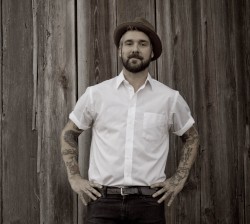Music | January 29th, 2016

Iowa-based singer songwriter William Elliott Whitmore plays sold-out shows throughout the Midwest, including his upcoming sold out show at The Fargo Brewing Company on January 31. HPR had the opportunity to catch up with him and discuss his musical beginnings as well as his latest album
HPR: Where did you find your musical beginnings?
William Elliott Whitmore: I grew up in a household with a lot of music around. My folks had a great record collection. My old man played guitar and my mom played the accordion and piano. My dad gave me his old Sears and Roebuck acoustic when I was 12 or 13 and a book of chords. From there I started learning popular songs as well as old country tunes. After a while I had something to say, so I started writing my own.
HPR: What was the music scene like in Iowa when you were growing up?
WEW: In my little hometown of Montrose there was no scene to speak of, although I do remember being a kid and seeing cover bands playing down at the community center every once and awhile. It wasn't until I left the farm at age 18 and moved to Iowa City, the nearest college town, that I discovered a vibrant musical community. I became aware of a DIY scene (a new term for me in those days) people were putting on shows in basements, living rooms, wherever you could pull off an all-ages event. It was exciting to learn that one didn't need any fancy booking agents or anything to make music, just a network of like-minded folks. If a band was passing through and needed a pick up show, you'd help them out, maybe even open up the show. Then when you were on the road, you could count on those same folks to put you up in their town. By the time I graduated into playing actual music venues (not better, just different) I already knew how to put on a good performance.
HPR: In the bio I found on your website, you mention that your early musical career started while opening for hardcore bands with banjo in hand--did you find it difficult to hold your own in these early experiences?
WEW: It was a great learning experience, having the opening slot before these loud bands. I learned how to cut through the dirge and make myself heard. It threw people off at first, having a one-man country band open up for an act like Song of Zarathustra, or Floorpunch. Luckily there was rarely any friction, I think people were just perplexed and therefore paid attention just out of curiosity. At that time not many folks in that world had ever even seen a banjo. I'm thankful for that education, and am still friends with a lot of those bands.
HPR: What inspired you to pick up the banjo in the first place?
WEW: My Grandpa played the banjo. It sat in the corner of the kitchen at their house for as long as I could remember. I thought it was a beautiful object. After he died my Grandma gave it to me and from there I took it wherever I went. It was just different than anything I'd ever heard.
HPR: Your lyrics have the recurring theme of respect, protection, sustenance, and survival--would you attribute this to your Midwest roots?
WEW: Yes. I've always felt that folks here in the "flyover states" have had to work a little harder to make an impression. Luckily hard work comes naturally to most of us.
HPR: Who are your influences?
WEW: Musically my influences range from the country stuff I grew up with, Willie Nelson, Hank Williams, Charley Pride, Roy Acuff, Doc Watson, to the punk and alternative I learned about later. Those were bands like the Minutemen, Fugazi, Public Enemy, The Cows, Hammerhead, The Bad Livers, stuff like that.
HPR: “Healing to do” definitely has a punk vibe. Do you foresee more pieces like this in the future?
WEW: That song was a chance to wear my influences on my sleeve a little bit. It started out sounding way more like the Everly Brothers but then evolved into a garage rock tune. I wanted to do something different, and to me it didn't feel like that much of a stretch. It's not my new direction or anything, I still like banjo the best.
HPR: Though your music incorporates the DIY punk aesthetic, you are identified as a folk/blues musician sometimes with only vocals, banjo, acoustic, etc. How has your audience responded to you “plugging in”?
WEW: I want to keep people on their toes a little. Folks don't seem to be bothered by it. I think it's all the same spirit no matter what instrument I use. It's fun to be loud sometimes.
HPR: In your bio you make a really beautiful analogy in regard to cultivating your music like you cultivate the soil…and you farm. How do you find time to farm and make music?
WEW: I live on the same farm I grew up on. It's very small by today's standards, 32 acres. My old man was a naturalist and did not like the impending wave of factory monoculture farming. The land wants diversity. He got out of planting row crops and got into horse breeding. My folks passed away a long time ago and after that the horses got sold. I started playing music full time and could not keep up the farm as it once had been. Now I have a huge subsistence food plot, a couple of horses, and chickens. I'm really more of a gardener than a farmer these days. I try to sing the praises of the small farm whenever I can.
January 12th 2026
September 16th 2025
August 19th 2025
June 9th 2025
February 18th 2025

_(1)__293px-wide.jpg)
_(1)_(1)_(1)_(1)_(1)__293px-wide.jpg)


